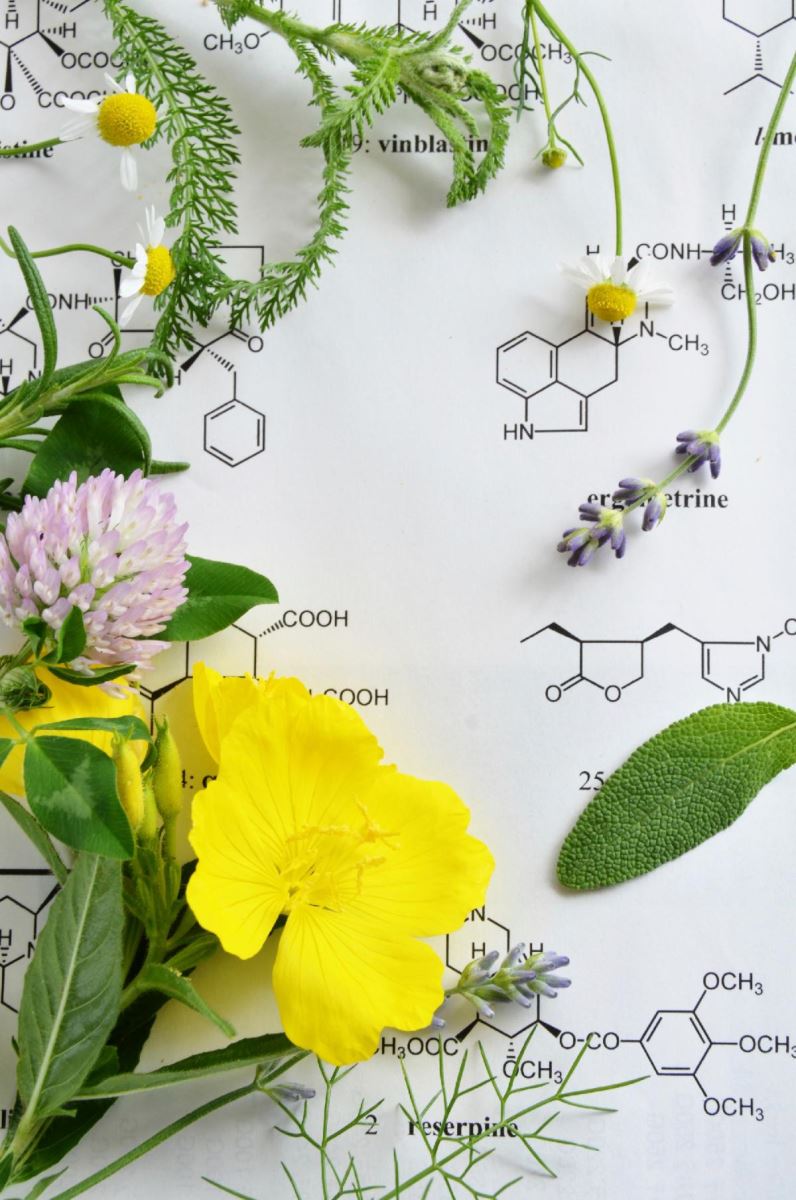|
CARBON Program Tackles Challenges Associated With Natural Product Research:
Awards of Nearly $27 Million Announced for 2020–2025
|
|

About 20 percent of adults in the United States use dietary supplements that contain botanicals or other natural products such as fish oil and probiotics. Americans spend billions of dollars per year on such supplements. Many of the ingredients in these dietary supplements have not been well studied. Research on natural products is difficult for many reasons, including the complexity and variations in their chemical makeup and limitations in research methods and technologies for studying chemically complex products. This leaves many questions unanswered about how these products interact with human biology and medication use.
The National Institutes of Health (NIH) Botanical Research Centers Program was established by the Office of Dietary Supplements (ODS) in 1999 following a mandate by Congress to advance the field of natural products research. Totaling almost $27 million, this latest round of competitive awards announced on June 23, 2020, includes three Botanical Dietary Supplements Research Centers (BDSRCs), a renewal of the Center for Natural Product Technology, Methodology, and Productivity Optimization (NP-TEMPO), and a Natural Products Nuclear Magnetic Resonance (NMR) Open Data Exchange (NP-NODE). These awards, all components of the NIH Consortium for Advancing Research on Botanical and Other Natural Products (CARBON) Program, are jointly funded by ODS, the National Center for Complementary and Integrative Health (NCCIH), and the National Institute on Aging (NIA). The funding is for 5 years to allow for significant progress to achieve research goals.
A Funding Opportunity Announcement (PAR-20-228) for the final component of the 2020–2025 CARBON Program has just been published, titled Pilot Projects Increasing the Impact of the NIH Centers for Advancing Research on Botanicals and Other Natural Products (CARBON). Applications are being accepted for R03 pilot projects collaborating with the newly awarded BDSRCs beginning October 1, 2020.
The aim of the CARBON Program is to advance cutting-edge research approaches for studying natural products; develop guidance and infrastructure to collect and share rigorous and FAIR (findable, accessible, interoperable, and reusable) natural products data; and accelerate progress toward clinical trials.
“This is an exciting opportunity to advance the study of complex natural products and to build transdisciplinary research capacity within the new centers and among the greater natural products research community,” explained Joseph M. Betz, Ph.D., Acting Director of ODS.
The newly awarded BDSRCs will increase understanding of the underlying biology and chemistry of dietary supplements that show promise for human health and resilience. In their second funding cycle, the NP-TEMPO will broaden the applicability of the innovative technologies the team has developed for overcoming obstacles in natural products research. The new NP-NODE will develop the collaborations, standards, software, and infrastructure to support a centralized, FAIR repository for natural products chemistry data.
“Exploring basic biological mechanisms of natural products is a strategic priority for us,” said Helene Langevin, M.D., Director of NCCIH. “These research centers demonstrate NIH’s firm commitment to rigorous investigation of natural products as they pertain to complementary and integrative health approaches.”
|
|
Botanical Dietary Supplement Research Centers (BDSRCs)
The three newly awarded BDSRCs and their research interests are as follows:
- Influence of Dietary Botanical Supplements on Biological and Behavioral Resilience
This award, to the Icahn School of Medicine at Mount Sinai in New York City, partnering with Rutgers, the State University of New Jersey in New Brunswick, will enable the research team, led by co-Principal Investigators Giulio M. Pasinetti, M.D., Ph.D., and James W. Murrough, M.D., Ph.D., to acquire data needed for maximally informative clinical trials of dietary supplements containing polyphenols derived from grapes, which may increase resilience to stress-induced psychological impairment.
- Botanicals Enhancing Neurological and Functional Resilience in Aging (BENFRA)
Amala Soumyanath, Ph.D., a researcher at Oregon Health & Science University in Portland, will lead a new center with Oregon State University, Oregon’s Wild Harvest, and the University of Mississippi, Oxford. This center will develop new data and techniques to inform the design and interpretation of future clinical trials of botanicals traditionally used for age-related changes in sleep, mood, and cognition. It will focus on two botanicals: Centella asiatica (gotu kola) and Withania somnifera (ashwagandha).
- Spirulina Oral Supplement for Enhancing Host Resilience to Virus Infection
At the University of Mississippi in University, researchers Ikhlas Khan, Ph.D., and Nirmal Pugh, Ph.D., partnering with the University of Mississippi Medical Center in Jackson, will explore Arthrospira platensis (spirulina), which has been reported to enhance resilience to and recovery from respiratory viral infections. They will determine the most effective formulations of standardized spirulina extracts and the optimal timing and dose for their administration. The investigators will also optimize methods to standardize these extracts and identify the most useful health outcomes or markers to measure in future spirulina clinical trials.
|
|
The Center for Natural Product Technology, Methodology, and Productivity Optimization award went to:
The Center for High-throughput Functional Annotation of Natural Products
In this successfully renewed center, researchers John B. MacMillan, Ph.D., and Roger G. Linington, Ph.D., have added Nadja B. Cech, Ph.D., of the University of North Carolina at Greensboro, to their leadership team as they continue their work to develop innovative, powerful ways of screening and predicting the mechanisms of action of complex natural products (rather than purified ingredients). This center, building on the existing partnership between the University of California, Santa Cruz, and Simon Fraser University in British Columbia, Canada, brings together experts in the chemistry of natural products, traditional uses of botanicals, biological screening, and bioinformatics. In addition to their work to strengthen the use of their methods for research on botanicals, they will work with the natural products research community to identify good practices so others may use and build on their methods.
|
|
The Center for Natural Products Nuclear Magnetic Resonance Open Data Exchange award went to:
Natural Products Magnetic Resonance Database (NP-MRD)
Principal Investigator John R. Cort, Ph.D., at the Pacific Northwest National Laboratory, will partner with Simon Fraser University, the University of Alberta in Edmonton, Canada, and the University of Missouri in Columbia, to develop the NP-MRD. Nuclear magnetic resonance technology is used to determine the structure of botanicals and other natural products. The NP-MRD will compile structures and related data for about 350,000 natural products into an open-access, web-enabled repository. It will also provide an extensive suite of user-friendly software tools for using the repository for natural products research.
Barbara C. Sorkin, Ph.D., Director of the CARBON Program, said, "We're excited that these new CARBON centers will increase our understanding of how herbs and foods affect health, develop new research approaches to advance the field of natural products research, and include more minority researchers as trainees and junior scientists."
|
|

Read more about the CARBON program and each research center funded for 2020–2025 on the ODS website.
|
|
New ODS Dietary Supplement Fact Sheets
|
|
ODS continues to expand its library of resources with new fact sheets on:
- Boron: health professional, consumer in English, and consumer in Spanish
- Copper: health professional, consumer in English, and consumer in Spanish
- Manganese: health professional, consumer in English, and consumer in Spanish
- Molybdenum: health professional, consumer in English, and consumer in Spanish
- Phosphorus: health professional, consumer in English, and consumer in Spanish
- Probiotics: health professional, consumer in English, and consumer in Spanish
See our full list of fact sheets on the ODS website.
|
|
Funding Opportunities
PA-20-227: Administrative Supplements for Research on Dietary Supplements (Admin Supp Clinical Trial Not Allowed)
PAR 20-228: Funding Opportunity Announcement "Pilot Projects Increasing the Impact of the NIH Centers for Advancing Research on Botanicals and Other Natural Products" (PI2 CARBON) (R03 Clinical Trials Not Allowed), will be accepting applications for R03 pilot projects starting on October 1, 2020. Applicants must have collaboration agreements with one or more of the newly awarded BDSRCs at the time of submission of their applications.
Learn more about ODS’s funding opportunities and research programs.
|
|
ODS Seminar Series
Throughout the academic year, ODS hosts seminars by scientists who conduct research on dietary supplements and related topics. Contact ODS to receive seminar announcements and information for viewing via webinar at [email protected].
These are the upcoming seminars for fall 2020:
- Wednesday, September 16, 2020, 11:00 a.m. (ET)
Frailty and protein supplementation
Shalender Bhasin, M.D.—Brigham and Women’s Hospital, Boston, MA
- Wednesday, October 14, 2020, 11:00 a.m. (ET)
Causality assessment for liver injury associated with dietary supplement use
Paul (Skip) Hayashi, M.D.—Division of Hepatology and Nutrition, Office of New Drugs, Center for Drug Evaluation and Research, US Food and Drug Administration, Silver Spring, MD
- Wednesday, November 18, 2020, 11:00 a.m. (ET)
Dietary fiber, gut microbiome ecology and causality
Jens Walter, Ph.D.—School of Microbiology, Department of Medicine, University College Cork, Ireland
- Wednesday, December 2. 2020, 11:00 a.m. (ET)
Laboratory Quality Assurance challenges for nutrition-related diet and clinical measurements
Christine Pfeiffer, Ph.D.—Division of Laboratory Science, Nutritional Biomarkers Branch, Centers for Disease Control and Prevention, Atlanta, GA
|
|
Recent ODS Staff Publications
ODS staff members regularly publish papers that address key issues in dietary supplements and related research. Visit the Staff Publications page on the ODS website for a complete list.
- Dwyer J, Saldanha L, Haggans C, Potischman N, Gahche J, Thomas P, Bailen R, Costello R, Betz JM, Andrews K, Gusev P, Pehrsson P, Savarala S, Tey P, Harnly J. Conversions of β-Carotene as Vitamin A in IU to Vitamin A in RAE. J Nutr. 2020 May 1;150(5):1337. doi: 10.1093/jn/nxz334. PMID: 32367133.
- Sorkin BC, Betz JM, Hopp, DC. Toward FAIRness and a user-friendly repository for supporting NMR data. J Org Chem. 2020 April 17;22(8):2867. doi: 10.1021/acs.orglett.0c01143. Epub 2020 Apr 3. PMID: 32243184.
- Saldanha LG, Dwyer JT, Haggans CJ, Mills JL, Potischman N. Perspective: Time to resolve confusion on folate amounts, units, and forms in prenatal supplements. Adv Nutr. 2020 Mar 5. pii: nmaa017. doi: 10.1093/advances/nmaa017.
- Sorkin BC, Kuszak AJ, Bloss G, Fukagawa NK, Hoffman FA, Jafari M, Barrett B, Brown PN, Bushman FD, Casper SJ, Chilton FH, Coffey CS, Ferruzzi MG, Hopp DC, Kiely M, Lakens D, MacMillan JB, Meltzer DO, Pahor M, Paul J, Pritchett-Corning K, Quinney SK, Rehermann B, Setchell KDR, Sipes NS, Stephens JM, Taylor DL, Tiriac H, Walters MA, Xi D, Zappalá G, Pauli GF. Improving natural product research translation: From source to clinical trial. FASEB J. 2020 Jan;34(1):41–65. doi: 10.1096/fj.201902143R. Epub 2019 Dec 10. PMID: 31914647.
- Gusev PA, Andrews KW, Savarala S, Tey PT, Han F, Oh L, Pehrsson PR, Dwyer JT, Betz JM, Kuszak AJ, Costello R, Saldanha LG. Disintegration and Dissolution Testing of Green Tea Dietary Supplements: Application and Evaluation of United States Pharmacopeial Standards. J Pharm Sci. 2020 Jun;109(6):1933-1942. doi: 10.1016/j.xphs.2020.02.005. Epub 2020 Feb 18. PMID: 32081719.
|
|

Have questions about dietary supplements? Ask ODS
ODS provides general information about dietary supplement ingredients in response to questions from consumers, health professionals, students, and others. While ODS cannot answer specific medical questions, make referrals, or give personal guidance on the use of dietary supplements, ODS’s registered dietitians on staff reply to each inquiry and give useful, scientific, and evidence-based information. Send your questions about dietary supplements to ODS: ods.od.nih.gov/contact.
|
|
Get timely messages from ODS through Facebook and Twitter. Like us on Facebook, follow us on Twitter!
|
|
|
|
Follow our tweets at @NIH_ODS. our tweets at @NIH_ODS.
|
|
ODS Update provides information on news, activities, and resources from the Office of Dietary Supplements (ODS). ODS is a program office within the Office of the Director of the National Institutes of Health (NIH). The mission of ODS is to strengthen knowledge and understanding of dietary supplements by evaluating scientific information, stimulating and supporting research, disseminating research results, and educating the public to foster an enhanced quality of life and health for the U.S. population.
To receive ODS Update via email, join the ODS listserv.
ODS Update is not copyrighted and is in the public domain. If you copy or distribute its content, please credit the NIH Office of Dietary Supplements and include the publication title and date. Do not use our information in any way that suggests we endorse any product or service.
|
|
About ODS
The Office of Dietary Supplements (ODS) is part of the National Institutes of Health (NIH), the nation’s medical research agency—supporting scientific studies that turn discovery into health.
|
|
Contact Us
Office of Dietary Supplements
National Institutes of Health
6100 Executive Blvd., Room 3B01
Bethesda, MD 20892-7517
|
|
|
|
|
|
|